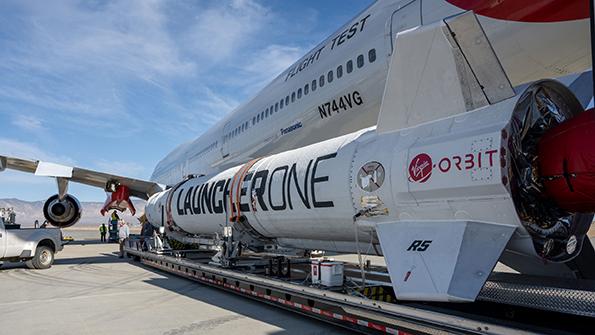
The two-stage small-satellite booster LauncherOne, developed by Virgin Orbit, has flown six times since its May 2020 debut.
California-based Virgin Orbit has spent the last six years honing the practice of launching rockets midair, delivering 33 satellites into orbit in four missions.
For its latest mission, Virgin Orbit shifted overseas, introducing indigenous launch services to the UK. However, gaining regulatory approvals proved cumbersome, and the company burned through cash as the flight slipped off the 2022 calendar and into 2023. On top of that, the mission failed, forcing another hiatus to pinpoint the cause of the accident.
- Skeleton staff recalled for work on next launch vehicle
- Company seeks new investment
Technically, returning to flight involves a relatively easy fix: Accident investigators determined that a fuel filter had dislodged, affecting the fuel pump in the rocket’s second-stage Newton4 (N4) engine and causing a premature engine shutdown. Its following rockets—including one nearing completion for Virgin Orbit’s next mission—are designed to include a more robust filter, the company said in a statement.
Financially, however, the company is in trouble. On March 16, Virgin Orbit suspended operations and furloughed almost all of its staff as it sought new funding. The company said it is “initiating a company-wide operational pause, effective March 16, and anticipates providing an update on go-forward operations in the coming weeks.”
On March 21, Virgin Orbit said it would initiate an incremental resumption of operations on March 23 to work on preparations for its next mission. “The operational pause for the remainder of its workforce is expected to continue through March 26,” the company said, adding that a further resumption of operations was expected on March 27.
Reuters reported on March 22 that Virgin Orbit was close to a deal for a $200 million investment from Texas-based venture capital investor Matthew Brown.
Virgin Orbit was founded by Richard Branson in 2017. Although Launcher--One’s first launch in May 2020 failed to reach orbit, it delivered 33 satellites into orbit in 2021 and 2022. The company had been expanding production of LauncherOne vehicles at its facility in Long Beach, California, where news of the suspension of operations was announced to staff on March 15.
Prior to its financial crisis, Virgin Orbit had laid out a strategy for increasing the payload performance of the liquid-oxygen/RP-1-fueled LauncherOne, as well as expanding its fleet of Boeing 747 launch and transport aircraft.
The upgraded vehicle, dubbed LauncherOne 1.1, was expected to incorporate an extended, more powerful N3 first stage and a modified N4 second stage. Compared to the existing 73,500-lb.-vacuum-thrust, pump-fed N3, the upgraded version was expected to generate approximately 25% more thrust, while the revised N4 was to feature a redesigned structure, higher-capacity tanks and improved avionics.
Prior to the loss of Rocket 7, the vehicle that failed during the UK launch attempt on Jan. 9, Virgin Orbit had planned to use Rocket 9 for the debut flight of the upgraded version. It is unknown whether the January launch failure changed this plan, which was intended to offer increased payload capability from the current “Block 1”-standard LauncherOne. Virgin Orbit did not expect any handling issues for the 747 with the larger vehicle, which was designed to be several feet longer and heavier than the baseline 70 ft.-long, 57,000-lb. vehicle.
Virgin Orbit also planned to buy a sister ship for its carrier aircraft, Cosmic Girl, and in May 2022 announced that it was acquiring two 747s through conversion specialist L3Harris Technologies. The first aircraft, which was to be a freighter variant to enable internal carriage of LauncherOne and associated ground support equipment, was provisionally due for delivery this year. The timeline for delivery of the second aircraft was to be driven by market requirements.
However, Virgin Orbit’s finances have been star-crossed since its disappointing public debut on Dec. 30, 2021. The transactions—including a reverse merger with a special-purpose acquisition company (SPAC)—left the startup with less than half the proceeds predicted when leaders had announced their deal-making four months earlier. Gross proceeds were expected to be $483 million, according to the original announcement.
Instead, the SPAC’s coffers provided $68 million, and direct investments from Boeing, private equity group AE Industrial Partners (AEI), Virgin Group, Mubadala Investment Co. and NextGen Acquisition Corp. II added $160 million. Five days before the reverse merger with NextGen, Virgin Group, along with NextGen Co--Chairmen George Mattson and Gregory Summe, guaranteed $100 million combined in additional direct investment “to satisfy the minimum cash condition” of $200 million under the original terms, the company said. In the end, going public raised only $228 million from the SPAC and direct investments.
In an August 2021 presentation, deal-makers said Virgin Orbit needed around $420 million before it expected to start generating pretax earnings in 2024. According to its last quarterly regulatory filing, submitted Nov. 8 for the three months through September 2022, the company had $71.2 million in cash and equivalents. It has received $55 million in financing from Virgin Group since then.
But not even hints about the company’s overall balance sheet were provided until the shutdown announcement March 15. In a March 20 regulatory filing, the company reiterated that it will not comment until its board of directors authorizes an announcement. The filing also outlined a severance package for its top three executives should there be a change in control of the company.
Ostensibly, fundraising for public companies comes via issuing new shares or debt obligations, the latter of which can be converted into shares. Obviously, the terms in these scenarios benefit the investors. A share offering would be tough, since the stock price was hovering around $1 per share before the shutdown and has since dropped well into penny-stock levels. If funds cannot be raised, companies can file for bankruptcy protection or liquidation.
A Sky News report said Virgin Orbit was working with restructuring firms in case of a bankruptcy filing and that Boeing was not involved in talks for additional investment.
It is unclear who would be interested in buying into or taking over Virgin Orbit. Small-rocket launching is a notoriously low-margin business, so much so that SpaceX and rival Rocket Lab both have moved, or are moving into, the medium-launch market. In addition, financing costs are rising as interest rates continue to climb.
On the other hand, part of Virgin Orbit’s business case since its public debut has been its potential to offer sovereign space access for any country that can host a 747. Rising geopolitical competition and growing defense budgets could attract another industry company or private equity sponsor to that potential business.
Private equity firms have effected half of mergers and acquisitions in aerospace and defense—AEI, one of Virgin Orbit’s investors, is the most active private equity firm. AEI bought rocket startup Firefly Aerospace out of its own turmoil a year ago, and it was an investor in Redwire, a now public budding in-orbit infrastructure provider. Another major private investor in space is Advent International, which is buying Maxar Technologies and took over British defense specialists Cobham and Ultra Electronics.







